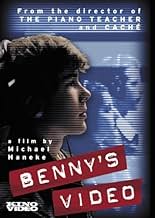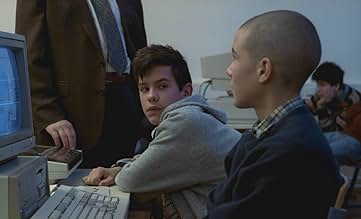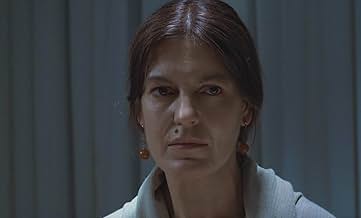VALUTAZIONE IMDb
7,1/10
19.983
LA TUA VALUTAZIONE
Un appassionato di video di quattordici anni non può più relazionarsi con il mondo reale.Un appassionato di video di quattordici anni non può più relazionarsi con il mondo reale.Un appassionato di video di quattordici anni non può più relazionarsi con il mondo reale.
- Regia
- Sceneggiatura
- Star
- Premi
- 2 vittorie e 3 candidature totali
Imelda Marcos
- Self
- (filmato d'archivio)
- (non citato nei titoli originali)
Hans Meiser
- Self
- (filmato d'archivio)
- (non citato nei titoli originali)
Brigitte Reimann
- Self
- (filmato d'archivio)
- (non citato nei titoli originali)
Martin Schoendeling
- Sales manager in videostore
- (non citato nei titoli originali)
Recensioni in evidenza
In his second film of the "glaciation trilogy", Haneke once more hauntingly draws a torpid affluent society where the people live at cross purposes, where conservations are rare and toilsome, where communication is alienated to a technical process. Accordingly to that, the emotional life of the protagonists became stunted: Benny, after his "act", shows concernment only through surrogate actions, just like letting his hair cropped. The father immediately slyly pushes to damage mitigation, whereas only the mother indicates rudiments of emotion, though somehow tense. In a confusing blend of film and video images, Haneke creates a second level of reality, so to speak, where Benny's senseless "act" perfectly integrates in the horror pictures of the evening news and makes it open for question. At the same time, Haneke commits himself to no specific answer and denies any absolution. That is what makes this film so horrifying - there simply is no telling argument that makes a murderer out of a young boy.
From its opening sequence, the film immerses us in Benny's world, an adolescent who lives through the images he captures with his handycam and what he watches on television. These images, where reality, media, and fantasy blend without clear boundaries, shape his perception of the world: saturated with spectacles, chaotic, and lacking deep understanding.
The plot gradually reveals that this apparent visual chaos conceals something far darker and macabre. Benny receives an advanced video camera from his parents, a gift intended to compensate for the lack of affection in his upbringing. However, this present becomes a tool that allows him to emotionally isolate himself and create his own world through the lens, disconnecting even more from his family and social environment.
Haneke's cold, clinical style enhances this disconnection, with slow-paced direction that emphasizes unsettling details, like Benny's manipulation of recordings. This approach leads us to a profound examination of the influence of media on the perception of reality, the normalization of violence, and the emotional impact it has on the youth.
A key symbol in the narrative is the video of the pig's slaughter, recorded by Benny. This repeated act not only desensitizes him to violence but also reinforces the notion that, for him, reality turns into a spectacle that can be controlled, edited, and replayed at will.
The film raises essential questions about the boundaries between reality and fiction, the responsibility of parents in the emotional formation of their children, and how media and technology shape our behavior and perception of the world. Although the story was conceived in another era, it eerily anticipates our present, where life seems not to exist unless it's captured on camera or posted on social media.
The plot gradually reveals that this apparent visual chaos conceals something far darker and macabre. Benny receives an advanced video camera from his parents, a gift intended to compensate for the lack of affection in his upbringing. However, this present becomes a tool that allows him to emotionally isolate himself and create his own world through the lens, disconnecting even more from his family and social environment.
Haneke's cold, clinical style enhances this disconnection, with slow-paced direction that emphasizes unsettling details, like Benny's manipulation of recordings. This approach leads us to a profound examination of the influence of media on the perception of reality, the normalization of violence, and the emotional impact it has on the youth.
A key symbol in the narrative is the video of the pig's slaughter, recorded by Benny. This repeated act not only desensitizes him to violence but also reinforces the notion that, for him, reality turns into a spectacle that can be controlled, edited, and replayed at will.
The film raises essential questions about the boundaries between reality and fiction, the responsibility of parents in the emotional formation of their children, and how media and technology shape our behavior and perception of the world. Although the story was conceived in another era, it eerily anticipates our present, where life seems not to exist unless it's captured on camera or posted on social media.
What makes BENNY'S VIDEO so disturbing is threefold:
#1- Benny (Arno Frisch) himself. We get the definite impression that something isn't quite right about him from the beginning. Mr. Frisch plays Benny with cold, lifeless ease. He is just going through the motions of everyday existence. When the unthinkable occurs, it's very matter-of-fact, like brushing crumbs off a table.
#2- Benny's parents (Angela Winkler and Ulrich Muhe). They are almost as mindless as their son. After watching the video, their reaction is, while not altogether unexpected, jaw-dropping nonetheless.
#3- Director Michael Heneke, who keeps everything clinical and icy. He shows us a psychopath in a "normal" environment, just doing the daily routines. The shocking parts are presented as mere interruptions in the daily grind. The motives of all concerned are what bring out the true terror. There are no masked maniacs here, only upper class people forced to deal with an "unfortunate" problem.
A classic film about the horror of indifference and self-preservation...
#1- Benny (Arno Frisch) himself. We get the definite impression that something isn't quite right about him from the beginning. Mr. Frisch plays Benny with cold, lifeless ease. He is just going through the motions of everyday existence. When the unthinkable occurs, it's very matter-of-fact, like brushing crumbs off a table.
#2- Benny's parents (Angela Winkler and Ulrich Muhe). They are almost as mindless as their son. After watching the video, their reaction is, while not altogether unexpected, jaw-dropping nonetheless.
#3- Director Michael Heneke, who keeps everything clinical and icy. He shows us a psychopath in a "normal" environment, just doing the daily routines. The shocking parts are presented as mere interruptions in the daily grind. The motives of all concerned are what bring out the true terror. There are no masked maniacs here, only upper class people forced to deal with an "unfortunate" problem.
A classic film about the horror of indifference and self-preservation...
I found this movie to be very disturbing, though it is not a violent movie. Benny is a normal teenager, except for his rather horrid taste for gore and death. This is a very thought provoking movie stumbling through a couple of different immoral issues, the end of this movie was a bit different to what I was expecting and did sort of knock me off place. I give it an 8 out of 10.
If it is supposed to be a Haneke film, it does have a couple of pitfalls. It is not Haneke's best, perhaps because maybe he felt the pressure to top Der Siebente Kontinent. As someone said previously, it is rather heavyweight towards the end.
As a film without regarding who directed it, it is very good. It provides you with a raw documentary vision of a boy and his voyeuristic trend towards violence. It is rather simple yet, an amazing idea. Benny could be the boy living next door and, in fact, he is. He is not frightning on a "I know what you did last Summer" fashion. He is _truly_ frightning because he is a normal kid. And I do know a few like him. The ones I know never actually murdered anyone but, perhaps they simply didn't do it because they are afraid. Benny hasn't come to terms with that moral feeling yet and perhaps he never will.
On a metaphorical sense, it is the best portrait (along with Der Siebente Kontinent) of present day Austria, at least the Austria I see at some September rainy Vienna weekends...
As a film without regarding who directed it, it is very good. It provides you with a raw documentary vision of a boy and his voyeuristic trend towards violence. It is rather simple yet, an amazing idea. Benny could be the boy living next door and, in fact, he is. He is not frightning on a "I know what you did last Summer" fashion. He is _truly_ frightning because he is a normal kid. And I do know a few like him. The ones I know never actually murdered anyone but, perhaps they simply didn't do it because they are afraid. Benny hasn't come to terms with that moral feeling yet and perhaps he never will.
On a metaphorical sense, it is the best portrait (along with Der Siebente Kontinent) of present day Austria, at least the Austria I see at some September rainy Vienna weekends...
Lo sapevi?
- BlooperWhen Benny leaves the phone booth in Egypt, the cameraman is visible in multiple window reflections.
- ConnessioniFeatured in Zomergasten: Episodio #9.5 (1996)
I più visti
Accedi per valutare e creare un elenco di titoli salvati per ottenere consigli personalizzati
- How long is Benny's Video?Powered by Alexa
Dettagli
- Data di uscita
- Paesi di origine
- Siti ufficiali
- Lingue
- Celebre anche come
- Відео Бенні
- Luoghi delle riprese
- Aziende produttrici
- Vedi altri crediti dell’azienda su IMDbPro
Contribuisci a questa pagina
Suggerisci una modifica o aggiungi i contenuti mancanti

Divario superiore
By what name was Benny's Video (1992) officially released in India in Hindi?
Rispondi














